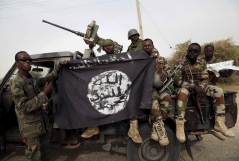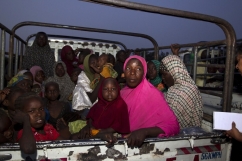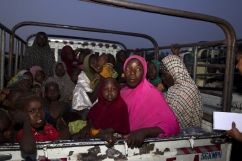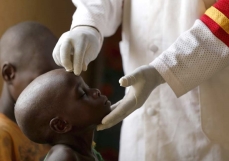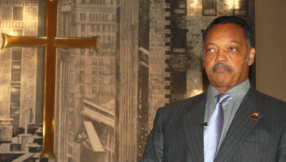Three young female suicide bombers exploded in two separate incidents on Tuesday and Monday in northeast Nigeria in attacks that bore the signature of the militant Islamist group Boko Haram.
At least 10 people were killed and more than 20 others were injured on Tuesday when a teenage girl attacked a market in Gujba, a town that Nigerian forces retook from Boko Haram earlier this year.
The militant Islamist group appears to be stepping up suicide attacks in towns and cities of Nigeria after losing most of its seized territory in the country's northeast since the start of the year.
A day earlier explosives strapped on two teenage girls exploded separately near a crowded mosque in Maidaguri, northeastern Nigeria's largest city, killing at least 30 people.
The apparent suicide bombings occurred amid fears that Boko Haram is using their captives to spread terror.
It was the fourth suicide attack in Maidaguri, deemed to be the birthplace of the Islamic extremist group Boko Haram, Fox News reported.
One teenage girl exploded as she came nearer to the mosque filled with worshippers coming from the nearby Baga Road fish market for the afternoon prayers during the holy month of Ramadan, according to a fishmonger who saw the blast.
Another teenage girl seemed to run away and then exploded farther away, killing no one but herself.
At least 30 corpses were found from the explosion, according to a civilian defence fighter who helped collect the bodies of the casualties.
Many who were injured were sent to the hospital for treatment.
Boko Haram has pledged allegiance to the Islamic State and has taken hundreds of girls and women captive, raising fears among people that the group is using those abducted in its terror campaign.
According to a military bomb disposal expert, most bombs brought by girls and women have remote devices, meaning they could not set off the bombs themselves which had to be triggered by other militants presumably in the area.
The group has increased its attacks after Nigeria's new president, Muhammadu Buhari, announced that the military command centre is moving to Maiduguri, the capital of Borno State, from Abuja, the capital in central Nigeria.
The country and its neighbours have been preparing to boost a multinational army that this year drove out Boko Haram from areas where it set up its so-called caliphate.
Bombings, hit-and-run attacks, and cross-border raids, however, have continued.
Over 60 percent of terrorist attacks last year occurred in Nigeria, Iraq, Pakistan, India, and Afghanistan, a new report by the US State Department on global terrorism showed.
Also, 78 percent of deaths were in Nigeria, Syria, Iraq, Pakistan, and Afghanistan, Newsweek wrote.
The number of people killed by terror attacks soared by 81 percent to 32,727 people last year compared to 2013, according to the National Consortium for the Study of Terrorism and Responses to Terrorism. Attacks also rose by 35 percent to 13,463.
The report pinned the blame on ISIS as a major contributor to the increase in violence.










